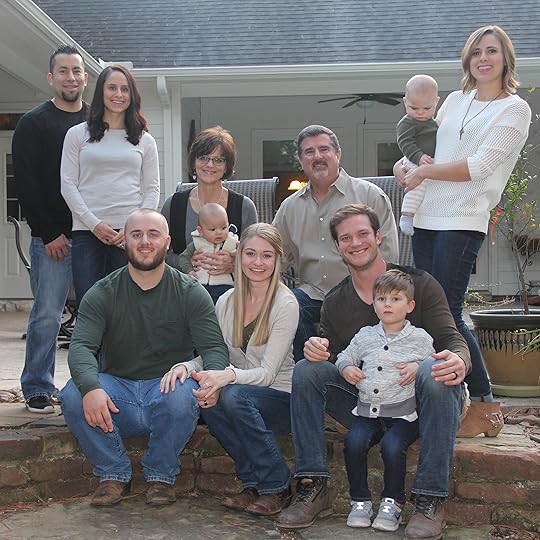Kathy Howard's Blog: Unshakeable Faith for Life, page 41
January 16, 2017
Do You Ever Try to Take Charge of Jesus?
 We know that Jesus’ mother Mary and His half-brother James became believers. But Jesus wasn’t always their Lord. There was a time when they tried to “take charge” of Jesus, to control Him.
We know that Jesus’ mother Mary and His half-brother James became believers. But Jesus wasn’t always their Lord. There was a time when they tried to “take charge” of Jesus, to control Him.
Last week, while preparing to teach a Bible study class, I came across the evidence. I’ve read the passage many times before, but this time God gave me some fresh application. Very personal application.
It was early in Jesus’ ministry. He had just called the Twelve. The crowds were growing and clamoring for His attention. They wanted more miracles. The Jewish leaders’ antagonism toward Jesus grew in correlation to His popularity with the common folk. And it all got back to Jesus’ family in Nazareth.
The scene opens with Jesus and His disciples in a house, probably tired and weary from travel and ministry. But the crowds found Him again, packing the dwelling and the immediate area. The demands of the people were so great, Jesus and the disciples could not even take time to eat.
That’s when we read this:
When his family heard about this, they went to take charge of him, for they said, “He is out of his mind.” Mark 3:21, NIV
Jesus’ family attempted an intervention. But why? The Scripture doesn’t give us details, just that they thought Jesus had lost His mind. Maybe they thought – like the Jewish leaders claimed – that Jesus was possessed by a demon. Maybe they thought He was the head of some outlandish cult. Maybe they were concerned about His safety or worried about their own reputation.
Whatever the exact reason, they decided to put a stop to it. To take charge. To make Jesus listen to reason and come home to Nazareth. They probably even thought they had Jesus’ best interests at heart.
If you think about it, it really is a funny scene. The little family entourage planned to seize Jesus and take Him against His will. That’s what “take charge” in this passage means. They planned to impose their will on the One who had been casting out demons and restoring sight to the blind.
Ridiculous, right?! But don’t we sometimes try to do the same? I do, anyway. See if you might fall into one of the following.
Do you ever try to #takecharge of #Jesus?
Click To Tweet
3 Ways We Try to Take Charge of Jesus
Ask Jesus to bless your plans – Oh boy! I’ve done this more times than I can count. I get carried away with all these great ideas for ministry and jump in. Then I take them to Jesus and ask for His blessing.
Attempt to manipulate Jesus – Have you ever asked God to trade favors? “Lord, if you will just do …, then I will do …” God doesn’t cut deals or make bargains.
Give God your wish list – I’m as guilty of this as anybody. I put my “prayer list” before God and expect Him to spit out the right answers like a divine vending machine.
3 ways we try to #control #Jesus. Who’s in charge?
Click To Tweet
These three things are just a sampling of some of the ways we Christians sometimes attempt to “take charge” of Jesus. We want to bend Jesus to our will instead of allow Him to bend us to His. I admit it. It’s a daily battle for me. That’s why the Holy Spirit so often reminds me of Galatians 2:20:
I have been crucified with Christ and I no longer live, but Christ lives in me. The life I now live in the body, I live by faith in the Son of God, who loved me and gave himself for me.
In what ways have you tried to “take charge” of Jesus? How can the spiritual truth found in Galatians 2:20 help us to give Jesus charge of us instead?
The post Do You Ever Try to Take Charge of Jesus? appeared first on Kathy Howard.
January 12, 2017
Are You Content with Your Stuff?


 Our family calls it the flood of 2003. One Saturday morning I stepped into ankle-deep water in the hallway outside our bedroom. I could hear water gushing somewhere close by and hurried to find the source. In the guest bathroom, water from the toilet supply line was shooting across the room. I turned off the water and began to survey the damage.
Our family calls it the flood of 2003. One Saturday morning I stepped into ankle-deep water in the hallway outside our bedroom. I could hear water gushing somewhere close by and hurried to find the source. In the guest bathroom, water from the toilet supply line was shooting across the room. I turned off the water and began to survey the damage.
Carpets and other flooring upstairs were ruined. But the bigger mess was downstairs. The ceiling directly under the bathroom had fallen and paint slid down the walls. Water saturated everything in that half of the bottom floor of our house. We spent the rest of the summer repairing, replacing, and renovating.
The accident and the resulting damage to our home hit me hard. The physical challenge of the cleanup overwhelmed me, but I also grieved the loss of our stuff. Later on – when I was ready to hear it – God showed me my reaction to this material loss revealed much about what I treasured most.
In the Sermon on the Mount, Jesus addressed this very issue (Matthew 6:19-21). He knows we humans tend to value the wrong things. We seek satisfaction, joy, and security in the fleeting things of this world. But jobs, possessions, money, and people cannot meet our deepest needs. They may temporarily mask our real need, but eventually discontentment rises to the surface again.
Stuffing lots of stuff isn’t the answer
We’ve been taught by the world that “stuff” is the answer. So we stuff all we can into the empty hole, but it never fills up. Only God can fully and permanently satisfy our spiritual need. When He becomes what we value most, then we will find true contentment.
We will find #contentment when #Jesus is what we value most.
Click To Tweet
During short-term mission trips, I’ve seen firsthand that Christians can be joyful and content without all the stuff we have in America. Believers in mud huts with dirt floors and thatched roofs ooze the joy of Christ. Brothers and sisters living in tiny Soviet block apartments experience the full life Christ gives.
Only Jesus can make us truly content
In fact, I believe our material “abundance” can foster discontent. Since we are used to having so much, we have convinced ourselves we need it all. We trade in perfectly good cars on ones that are newer, brighter, or faster and we up-size our homes even when we can’t afford it.
Material #abundance fosters #discontent
Click To Tweet
The apostle Paul learned contentment in material need or plenty because he did not base his attitude on his physical circumstances (Philippians 4:10-13). Paul looked to Christ for strength in every situation, including physical need. The only thing Paul could not do without was Christ.
I wonder, can we say the same?
If we are completely honest with ourselves, what would be on our list of things we can not do without?
The post Are You Content with Your Stuff? appeared first on Kathy Howard.
January 9, 2017
5 Routines to Find Freedom


 This guest post by author Cheri Gregory is a giveaway! Read to the bottom to find out how to enter for a chance to win a copy of “Overwhelmed: How to Quiet the Chaos and Restore Your Sanity” by Kathi Lipp and Cheri Gregory.
This guest post by author Cheri Gregory is a giveaway! Read to the bottom to find out how to enter for a chance to win a copy of “Overwhelmed: How to Quiet the Chaos and Restore Your Sanity” by Kathi Lipp and Cheri Gregory.
I used to avoid routines. I knew they worked for other people, but to me they felt rigid.
I spent years telling myself, I’m a free spirit. My creative soul would be crushed by routines.
Then I read a paradigm-shifting statement in the book Triggers. Marshall Goldsmith said that structure can serve as “a surrogate for self-discipline.” This grabbed my attention, because I’ve never had much self-discipline.
The right routines replace self-discipline? Sign me up!
Living Without Structure Isn’t Freedom
While developing and implementing my new routines, I quickly discovered how much time and energy I had wasted living “spontaneously.”
When every task was up for grabs every day—Exercise today or sleep in?… Slacks or skirt?… Quiet time now or postpone ‘til tonight?— I was constantly overwhelmed with decision fatigue.
In the time I would spend debating whether or not to do something, I could have gotten it done.
Living without structure isn’t freedom; it’s a free-for-all that turns into chaos.
Conversely, routines guarantee that my Personal Manifesto—a simple written statement of who I am and who I aspire to be, by God’s grace and power—gets walked out in my everyday life.
5 Routines to Follow for Freedom
I’ve experimented with various routines and settled on these five non-negotiables:
Routine #1: Evening Routine
When I follow my evening routine, I’m ready for the day. When I don’t, I’m not. Sounds obvious. But I’ve been surprised to discover how much rises and falls on my faithfulness to my evening routine.
My friend and co-author Kathi Lipp puts it this way: “Our most important evening job is to get set up for tomorrow.”
(For a free evening routine worksheet, click here.)
Routine #2: Morning Routine
Whenever I get to mid-day, consider my morning, and think, “Well, that was time well spent!” you can be sure I followed my morning routine.
And whenever I get to mid-day and ask myself, “Where did the morning go? Why didn’t I get anything important done?” you can be sure I didn’t.
First-thing-in-the-morning Me is energetic and creative but highly distractable. My morning routine keeps focused.
(For a free morning routine worksheet, click here.)
Routine #3: Weekly Routine
I used to try to squeeze the necessary tasks of life—like bill-paying, grocery shopping, dental visiting, and the like—into my spare time.
Problem was, I rarely had any. And when I did, I wasn’t actually prepared to tackle any necessary tasks.
A weekly Prep and Plan Day has changed all that. Every week, I have several hours set aside to pull back, prepare for the upcoming week, and plan for the following weeks and months.
To make lists. Go shopping. Call to set appointments. Deal with paperwork. Do filing.
I don’t think I’ll ever find these sorts of tasks fun, but they are far more satisfying when I schedule time to do them. And then get them done.
Routine #4: Self-Care Routine
Most of us were taught to take good care of the people in our lives – often at our own expense. Yet, our ability to care for others is hindered if we don’t first take good gentle care of ourselves.
A self-care routine means that no matter what kind of day (week…month…year…) I’m having, I take care of myself. Period.
Routine #5: Quiet Time Routine
Pairing the word “routine” with the phrase “Quiet Time” does not automatically mean “rigid.”
Developing a Quiet Time routine that works for you simply means that spending time with God becomes a non-negotiable. It’s something you do every day, in some way, to re-connect to your Creator. And to grow in the fruit of the Holy Spirit. One characteristic which, of course, is self-discipline. Which makes our routines self-reinforcing, in the best possible way.
I used to believe that freedom meant having unlimited choices. But to my surprise, it’s having pre-decided routines that makes me feel free.
Established routines will set you free!
Free from wrestling with self-discipline.
Free from decision fatigue.
Free to live with integrity.
This post is a giveaway! Enter for a Chance to Win!
Kathi and Cheri would like to send a copy of Overwhelmed: Quiet the Chaos & Restore Your Sanity to one of our readers! To qualify for the drawing, you need to do TWO things:
LEAVE A COMMENT below.
SHARE THIS POST on social media.
That’s it! Once you do both, your name will be entered into the random drawing. Be sure to tell your friends so they can sign up too. The drawing will take place on Friday, January 13, so don’t delay! {Contest is limited to US & Canadian readers only.}
Free Offer from Cheri and Kathi
New Year’s resolutions seldom last, but a Personal Manifesto will carry you through the rest of your life! Sign up for great ideas and resources about how to get out from Overwhelmed and you will receive “How to Write Your Personal Manifesto” as our gift to you. Get off the overwhelming cycle of making and breaking resolutions and create a gentle plan for lasting life change.
About “Overwhelmed: How to Quiet the Chaos and Restore Your Sanity”
 Feeling overwhelmed? Wondering if it’s possible to move from “out of my mind” to “in control” when you’ve got too many projects on your plate and too much mess in your relationships?
Feeling overwhelmed? Wondering if it’s possible to move from “out of my mind” to “in control” when you’ve got too many projects on your plate and too much mess in your relationships?
Kathi and Cheri want to show you five surprising reasons why you become stressed, why social media solutions don’t often work, and how you can finally create a plan that works for you. As you identify your underlying hurts, uncover hope, and embrace practical healing, you’ll understand how to…
Trade the to-do list that controls you for a calendar that allows space in your life
Decide whose feedback to forget and whose input to invite
Replace fear of the future with peace in the present
You can simplify and savor your life—guilt free! Clutter, tasks, and relationships may overwhelm you now, but God can help you overcome with grace.
 Kathi Lipp is a busy conference and retreat speaker and the bestselling author of several books, including Clutter Free, The Husband Project, and The Get Yourself Organized Project. She and her husband, Roger, live in California and are the parents of four young adults.
Kathi Lipp is a busy conference and retreat speaker and the bestselling author of several books, including Clutter Free, The Husband Project, and The Get Yourself Organized Project. She and her husband, Roger, live in California and are the parents of four young adults.
Cheri Gregory spends her weekdays teaching teens and weekends speaking at women’s retreats. She’s been married to her college sweetheart, Daniel, for more than 28 years. The Gregorys and their young adult kids, Annemarie and Jonathon, live in California.
The post 5 Routines to Find Freedom appeared first on Kathy Howard.
January 5, 2017
3 Quiet Time Cautions


 We are five days into the New Year. Five days into starting fresh. And, for many Christians, five days into working toward a new set of spiritual goals. Perhaps you even set some goals and strategies for a regular quiet time.
We are five days into the New Year. Five days into starting fresh. And, for many Christians, five days into working toward a new set of spiritual goals. Perhaps you even set some goals and strategies for a regular quiet time.
Regularly on this blog and when I speak, I encourage believers to “train themselves for godliness.” This website offers dozens of free tools and resources to help. Including quiet time tips. But today, I want to go to the flip side of the coin and share some words of caution about quiet time.
3 Cautions for Your Quiet Time
Don’t do all the talking – Why do many of us always talk more than we listen? It’s a bad enough habit with our friends and family, but it’s far worse with God. Yet, often we allow prayer to become a one-way conversation. We end up talking at God instead of with Him. Honestly, this is a struggle for me. I have to remind myself to listen, to sit quietly and allow the King of the universe to speak. And isn’t it amazing that He does?!
Don’t be unprepared – It is not unspiritual to plan and prepare. Jesus told His disciples to count the cost of following Him. Paul wrote to Timothy that he must “train Himself for godliness.” Both teach us that we must be purposeful and diligent in our discipleship and spiritual growth. Keep your tools – Bible, pen, journal, etc. – together and at hand, ready to go each morning. And have a Bible reading plan. Dropping open your Bible and pointing your finger is haphazard at best.
Don’t succumb to legalism – This point does not contradict caution #2. Our goal should be to be prepared but flexible. I am a list maker who loves to check off the boxes. Too many times, I have found myself rushing through my Bible reading so I can check off the day’s box. Or I felt guilty when I missed a day of quiet time. Legalism in our quiet time robs us of its joy and inhibits the intimacy we long to have with God. Let’s keep our goals in mind, but let’s also follow the leading of the Holy Spirit to “get off script,” and give ourselves some grace when life gets in the way.
The post 3 Quiet Time Cautions appeared first on Kathy Howard.
January 2, 2017
Discipleship Resources for 2017


 Did your purposeful commitment to spiritual growth fall by the wayside some time during 2016? Maybe your time in God’s Word became sporadic. Maybe your prayer time dwindled. Well, there’s no better time to renew your commitment to discipleship and recommit to your time with God than the New Year. This post is chock full of discipleship resources, tips, and tools to help you get started and keep going all year.
Did your purposeful commitment to spiritual growth fall by the wayside some time during 2016? Maybe your time in God’s Word became sporadic. Maybe your prayer time dwindled. Well, there’s no better time to renew your commitment to discipleship and recommit to your time with God than the New Year. This post is chock full of discipleship resources, tips, and tools to help you get started and keep going all year.
A Place to Start
The following four posts/tools will help you figure out where you are spiritually and where God is leading you in the New Year.
Discipleship Evaluation Tool – honestly evaluate your current spiritual condition. This tool covers 17 different key discipleship areas. Your weakest areas of 2015 can be great growth areas in 2016.
Spiritual Goals Worksheet – Planning is not “unspiritual.” Living a life that glorifies God will not happen by accident. This tool walks you through specific areas of discipleship such as time with God, ministry, service, and Christian education to help you set New Year goals.
Setting goals for spiritual growth – These five tips will help you set doable, personal discipleship goals that will keep us growing through the year.
3 Steps to Create a Hunger for the Bible – Do you long to hunger for God’s Word but right now your desire is limited?
Collection of #free #DiscipleshipResources to help you meet #2017 goals
Click To Tweet
General Discipleship Resources
The following posts each offer a collection of resources and tools to help you meet your goals.
Free Discipleship Tools – Collection of Bible Reading Plans, Discipleship Helps, and other tools.
7 “Must-Have” Bible Study Resources – If you are serious about studying the Bible then consider building a library of resources to help you. These basic tools that will be helpful no matter what topic, book, or character you’re studying.
Online Tools to Aid in Your Personal Bible Study – This list of online sites includes tools to assist you in your study of the Bible.
List of General Discipleship Resources and helps – This list includes websites, books, and other resources.
Specific Discipleship Helps
This last group of resources focuses on a specific area of discipleship like quiet time, prayer, Bible reading, or Scripture Memory.
Quiet Time Tips
5 Bible Reading Plans to take You through 2016
5 Probing Questions to Meditate on Scripture
Scripture Memory Tips
7 Activities to Help You Memorize Scripture
I hope these resources will help you meet your 2017 spiritual growth goals. I’d love to hear from you about how God is leading you to step out in the New Year!
The post Discipleship Resources for 2017 appeared first on Kathy Howard.
December 29, 2016
5 Tips for Setting Spiritual Growth Goals for 2017


 This time of year, many of us reflect on the condition of our lives. We may evaluate the health of our bodies, our relationships, or our work situation. We may even “resolve” to change things. But if we’re really serious about improvement, we will set some goals and establish a plan to move forward. But have you ever considered doing the same with your spiritual health? The New Year is the perfect time to do some “spiritual evaluation” and set some goals for spiritual growth.
This time of year, many of us reflect on the condition of our lives. We may evaluate the health of our bodies, our relationships, or our work situation. We may even “resolve” to change things. But if we’re really serious about improvement, we will set some goals and establish a plan to move forward. But have you ever considered doing the same with your spiritual health? The New Year is the perfect time to do some “spiritual evaluation” and set some goals for spiritual growth.
We can’t cause our spiritual growth. Only the Holy Spirit has the power to transform us into the image of Christ (2 Corinthians 3:18). But God does expect our obedient and active cooperation (1 Corinthians 9:24-27). One way we can purposefully “train ourselves to be godly” (1 Tim 4:7-8) is through spiritual evaluation and goal setting.
Tools to help you #evaluate and set #SpiritualGoals for #2017
Click To Tweet
This post includes both a “Discipleship Evaluation” tool and a “Spiritual Goals Worksheet” for you to do just that. But keep in mind, resolutions and goals are often hard to keep. Statistics show that, at best, only 46% of New Year’s resolutions are still kept six months into the year. People lose their resolve quickly because they set unattainable goals.
First, use this free Discipleship Evaluation form to honestly evaluate your current spiritual condition. This tool covers 17 different key discipleship areas. Your weakest areas can be great growth areas in 2017.
Next, set spiritual growth goals using the five tips below. Planning is not “unspiritual.” Living a life that glorifies God will not happen by accident. This free “Spiritual Goals Worksheet” walks you through specific areas of discipleship such as time with God, ministry, service, and Christian education.
Most importantly, ask God to guide you as you evaluate your spiritual health and set goals for growth. He will bring the spiritual transformation as you strive to live a live that pleases Him.
5 tips to help you make #Spiritual #resolutions for #2017
Click To Tweet
5 Tips for Setting Goals for Spiritual Growth
The following five tips will help us set personal discipleship goals that will keep us growing through the year:
Concentrate your efforts. Set just one, two, or three goals at a time. Don’t spread yourself too thin. When you experience success then add another goal.
Be realistic. Set attainable goals. If you don’t read your Bible regularly now, don’t set a goal to read the entire Bible in three months. Instead commit to read it 3 to 5 times per week.
Think concretely. Set goals so progress can be measured. For instance, this goal is too ambiguous: I’m going to spend more time with God. Instead be concrete: I will read one Bible chapter and pray for 10 minutes five times a week.
Include strategies. Develop strategies designed to move you toward your goals. If one goal is to memorize Scripture, determine how you will do that. What verses you will memorize? How often you will tackle a new one? What memorization techniques you will use?
Create manageable steps. Break your overall goal into a series of smaller goals that are doable and will foster success.
Be sure to come back by on Monday for a resource list to help you meet your goals!
How do you feel about setting spiritual goals? Have you ever set spiritual goals in the past?
The post 5 Tips for Setting Spiritual Growth Goals for 2017 appeared first on Kathy Howard.
December 26, 2016
5 Reflection Questions for 2016
 With a new year just days away, it’s the perfect time to reflect on the year just ending. But why bother to look back? Shouldn’t we forget the past and focus on what lies ahead? After all, we cannot change what has already happened. We can’t go back. We can only move forward. In fact, didn’t the apostle Paul tell us to forget what is behind? Here’s his words from his letter to the believers in Philippi:
With a new year just days away, it’s the perfect time to reflect on the year just ending. But why bother to look back? Shouldn’t we forget the past and focus on what lies ahead? After all, we cannot change what has already happened. We can’t go back. We can only move forward. In fact, didn’t the apostle Paul tell us to forget what is behind? Here’s his words from his letter to the believers in Philippi:
Not that I have already obtained all this, or have already arrived at my goal, but I press on to take hold of that for which Christ Jesus took hold of me. Brothers and sisters, I do not consider myself yet to have taken hold of it. But one thing I do: Forgetting what is behind and straining toward what is ahead, I press on toward the goal to win the prize for which God has called me heavenward in Christ Jesus. Philippians 3:12-14
Paul did not mean we should never reflect on the past. In fact, earlier in the chapter, he had done just that. (See Philippians 3:4-6 and check this post for more.) His point in verses 12-14 was that he refused to allow anything in his past to foster a false sense of “arrival.” Dwelling on past spiritual “accomplishments” would only lull him into inactivity. Instead, he committed to continue moving towards spiritual maturity with determination.
#LookingBack helps us move forward with new purpose #NewYear
Click To Tweet
Reflecting on what God has done in our past can help us see His continued path for us. The clearer picture we have of what He has been doing, the better sense we can have of where He is taking us next.
5 #reflection questions for #2016
Click To Tweet
5 Questions for Purposeful Reflection on 2016
What trials and difficulties has God brought me through this year that He may want to use to comfort and encourage someone else who will go through similar circumstances?
What learning or training experiences did God bring into my life that could be His preparation for future areas of ministry?
What new people have crossed my path in 2016 that God may want me to develop a relationship with?
What major life change or event occurred in 2016 that God may want to use as a crossroads for a new direction?
What has God taught me about Himself this year – Who He is and how He works – that needs to impact my relationship with Him and others?
My 2016 has been full of significant life events – some joyous and some painful. My husband Wayne and I have already done a lot of reflecting, talking, and praying about how it all impacts what God wants to do with us in 2017. Some major changes seem to be coming in the near future. (Stay tuned!)
I pray God will give you insight and wisdom as you take time to reflect on the past 12 months. May He also grant you clear direction for the year ahead. Happy New Year!
The post 5 Reflection Questions for 2016 appeared first on Kathy Howard.
December 22, 2016
May Your Christmas Be Merry and Light!


Christmas celebrates the birth of Jesus. The coming of God to mankind. We needed a Savior. We were stumbling around in the dark and could not save ourselves. We needed a Light.
Then two thousand years ago, the Creator set His rescue plan in motion. The King left His throne in heaven and entered the world as a humble babe in a stable in Bethlehem.
In the beginning was the Word, and the Word was with God, and the Word was God. He was with God in the beginning. Through him all things were made; without him nothing was made that has been made. In him was life, and that life was the light of all mankind. The light shines in the darkness, and the darkness has not overcome it.
John 1:1-5
Jesus is the light of the world (John 8:12). Anyone who believes in Jesus will cross from death to life. From darkness to light.
For God so loved the world that he gave his one and only Son, that whoever believes in him shall not perish but have eternal life. For God did not send his Son into the world to condemn the world, but to save the world through him. Whoever believes in him is not condemned, but whoever does not believe stands condemned already because they have not believed in the name of God’s one and only Son. John 3:16-18
May the Light of the world fill your heart with His joy this Christmas.
The people walking in darkness
have seen a great light;
on those living in the land of deep darkness
a light has dawned.
For to us a child is born,
to us a son is given,
and the government will be on his shoulders.
And he will be called
Wonderful Counselor, Mighty God,
Everlasting Father, Prince of Peace.
Isaiah 9:2,6
From my family to yours, Have yourself a Merry and Light Christmas!

The post May Your Christmas Be Merry and Light! appeared first on Kathy Howard.
December 19, 2016
Broken Christmas
 Ever wonder if this year will be the year of your perfect Christmas? You’ll find that impossible-to-find toy. There won’t be any arguing around the dinner table. And the turkey will not be dry.
Ever wonder if this year will be the year of your perfect Christmas? You’ll find that impossible-to-find toy. There won’t be any arguing around the dinner table. And the turkey will not be dry.
But no matter how hard we work, how hard we hope, something always goes wrong. Not everything is the way we want it to be. In fact, some years things are worse than merely imperfect. Sometimes they are truly broken beyond repair.
Our world is full of brokenness. Broken families. Broken bodies. Broken futures.
Sin’s devastating effects are all around us, constantly impacting us. Illness and disease. Evil and violence. Lust and greed. Pain and loss.
Scripture says that all creation groans under sin’s weight (Romans 8:20-21). Even God’s children feel the burden and long for the day that Christ’s redemption will be fully realized:
We know that the whole creation has been groaning as in the pains of childbirth right up to the present time. Not only so, but we ourselves, who have the firstfruits of the Spirit, groan inwardly as we wait eagerly for our adoption to sonship, the redemption of our bodies. Romans 8:22-23
Yes, Jesus came to bring salvation. His death and resurrection brought victory over sin and death. But the last effects will not be wiped away until Jesus comes again.In the meantime, we groan.
Are you groaning this Christmas?
Click To Tweet
Sometimes Christmas only magnifies our groaning. We are expected to be joyful and hopeful. Yet it is easy to allow our circumstances to overshadow joy and hope.
But here’s the Good News. This Christmas may not be perfect. Indeed, it may be shattered. But believers have an unshakeable joy and a sure hope in our Christmas yet-to-come. When Immanuel comes again, He will make everything right. Everything broken will be whole again.
For the Lord himself will come down from heaven, with a loud command, with the voice of the archangel and with the trumpet call of God, and the dead in Christ will rise first. After that, we who are still alive and are left will be caught up together with them in the clouds to meet the Lord in the air. And so we will be with the Lord forever. Therefore encourage one another with these words. 1 Thessalonians 4:16-18
A #BrokenChristmas does not have to be #joyless and #hopeless
Click To Tweet
A broken Christmas does not have to be joyless and hopeless. While we wait for the Christmas yet-to-come, we cling to Christ’s love (Romans 8:38-39), we depend on God’s strength (Philippians 4:13), and we rest in the Father’s grace (2 Corinthians 12:9-10).
The post Broken Christmas appeared first on Kathy Howard.
December 15, 2016
3 Activities for a Meaningful Christmas


 Christmas is just a little over a week away. If you’re like most people, you’ve been working to prepare for the big day since you stored the leftover Thanksgiving turkey in the fridge. So how’s that been working out for you? Do you feel more joyous or frantic?
Christmas is just a little over a week away. If you’re like most people, you’ve been working to prepare for the big day since you stored the leftover Thanksgiving turkey in the fridge. So how’s that been working out for you? Do you feel more joyous or frantic?
It’s so easy to get caught up in the busyness and expectations of the season. Shopping, decorating, baking, cleaning. There seems to be no end. But much of that activity flows from a commercialized version of Christmas. And we don’t have to buy into it.
What should Christmas look like for us? How should we recognize and celebrate the birth of our Savior? A good place to begin is at the beginning. The biblical account of the very first Christmas shows us how those close to Jesus responded to His arrival.
These 3 activities reflect the first #Christmas
Click To Tweet
3 Activities for a Meaningful Christmas
Share Jesus – Remember the shepherds? The ones out in the field watching over their flocks by night? (See Luke 2:8-20). After they found baby Jesus in the manger – just like the angel of the Lord had told them – they couldn’t keep the news to themselves. They “spread the word” everywhere that the Savior had been born! Can’t you just hear them? The Messiah has come! The long-awaited One is here! We’ve seen Him for ourselves! The shepherds were the first in a long line of witnesses to the Savior. Who can you tell today?
Ponder Jesus – If anyone in the first Christmas story had cause to “ponder” it was Mary. An angel’s visit. A miraculous pregnancy. And a bunch of shepherds with a wild story about an angelic choir. No wonder the Gospel writer penned “But Mary treasured up all these things and pondered them in her heart” (Luke 2:19). She had a lot to think about. A lot to hold close to her heart for God to apply in His time. We can “ponder” Jesus too. Take time before Christmas to sit quietly and consider what the birth of Jesus means for you.
Worship Jesus – The magi traveled a long way to worship the baby King (Matthew 2:1-2, 11). Yet sometimes we simply forget. Or get too busy. Let’s not simply observe a holiday. Let us bow our knee before Jesus and worship our Savior, Lord and King.
What are some ways we can we share, ponder, and worship Jesus today?
The post 3 Activities for a Meaningful Christmas appeared first on Kathy Howard.



